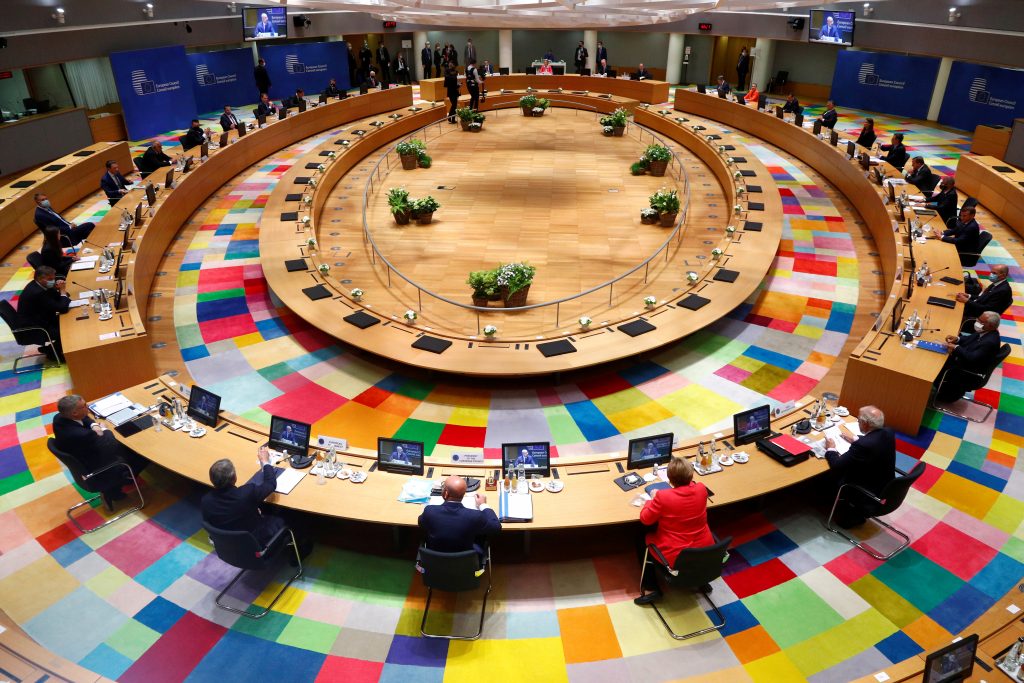European Union leaders failed on Friday to make headway in negotiations over a massive stimulus plan to breathe life into economies ravaged by the coronavirus pandemic, returning to their Brussels hotels shortly before midnight to rest and try again in the morning.

Many of the 27 heads declared on arrival for their first face-to-face summit for five months that a deal was crucial to rescue economies in free fall and shore up faith in the EU, which has lurched for years from crisis to crisis.
But officials said a thrifty camp of wealthy northern states led by the Netherlands stood its ground on access to the recovery fund, in the face of opposition from Germany, France, southern nations Italy and Spain, and eastern European states.
The proposed sums under discussion include the EU’s 2021-27 budget of more than 1 trillion euros and the recovery fund worth 750 billion euros that will be funneled mostly to Mediterranean coast countries worst affected by the pandemic.
Diplomats said the 27 remained at odds over the overall size of the package, the split between grants and repayable loans in the recovery fund and rule-of-law strings attached to it.

But the main stumbling block was over vetting procedures to access aid, an EU official said, with Dutch Prime Minister Mark Rutte demanding that one country could block payouts from the fund if member states backslide on economic reform.
“If they want loans and even grants then I think it’s only logical that I can explain to people in the Netherlands … that in return those reforms have taken place,” Rutte said, estimating the chances for a deal at fifty-fifty.
Polish premier Mateusz Morawiecki was even more gloomy.
As the leaders broke up for the day, he tweeted that they were divided by a bundle of issues and said it was “highly probable” that they would fail to reach a deal on Saturday or even on Sunday if the summit drags past its scheduled two days.
German Chancellor Angela Merkel, who celebrated her 66th birthday around the negotiating table in Brussels, was also cautious on chances for an agreement, envisaging “very, very difficult negotiations.”
After initial elbow bumps between the leaders – all wearing face masks – and birthday gifts for Merkel and Portuguese Prime Minister Antonio Costa, tense meetings followed in the evening with Rutte and Hungarian Prime Minister Viktor Orban.

‘The whole world is watching us’
Orban, who critics accuse of stifling the media, academics and NGOs, threatened to veto the entire plan over a mechanism that would freeze out countries that fail to live up to democratic standards.
With EU economies deep in recession and immediate relief measures such as short-time work schemes running out, the specter of an autumn of hardship and discontent is looming.
The EU is already grappling with the protracted saga of Britain’s exit from the bloc and is bruised by past crises, from the financial meltdown of 2008 to feuds over migration.
Another economic shock could expose it to more eurosceptic, nationalist and protectionist forces, and weaken its standing against China, the United States or Russia.
“The stakes couldn’t be higher,” said European Commission President Ursula von der Leyen. “The whole world is watching us.”

Despite wrangling over medicines, medical gear, border closures and money, the EU has managed to agree a half-a-trillion-euro scheme to cushion the first hit of the crisis.
Mediterranean countries now want the recovery financing to prevent their economies taking on ever-greater burdens of debt.
“The big picture is that we are faced with the biggest economic depression since World War Two,” Greek Prime Minister Kyriakos Mitsotakis said. “We need … an ambitious solution because our citizens expect nothing less from us.” ($1 = 0.8787 euros)
(Reporting by Gabriela Baczynska in Warsaw, Elizabeth Pineau and Mathieu Rosemain in Paris, Belen Carreno and Inti Landauro in Madrid, Michelle Martin and Andreas Rinke in Berlin, Marton Dunai in Budapest, Jan Lopatka in Prague, Kirsti Knolle in Vienna, Anthony Deutsch and Toby Sterling in Amsterdam, Robin Emmott, Kate Abnett, John Chalmers, Marine Strauss and Francesco Guarascio in Brussels; Writing by John Chalmers and Gabriela Baczynska; Editing by Sonya Hepinstall)




Comments